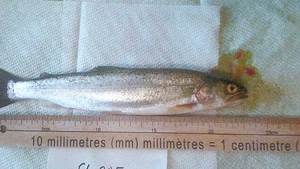Controversial virus found in fresh water fish in B.C.

A controversial virus has been detected in freshwater fish in B.C., but experts disagree about what the results mean for B.C.'s wild fish stocks.
Simon Fraser University Professor Rick Routledge says he found evidence of the piscine reovirus in 13 of 15 cutthroat trout sampled from Cultus Lake, located in the Fraser Valley east of Vancouver.
According to Routledge, the virus is widespread in Norwegian salmon farms where it has been linked the death of 20 per cent of infected fish.
Routledge says after he started testing with a biologist from the Watershed Watch Salmon Society, it was not hard to find fish infected with the virus.
"We found it because we looked. It's as simple as that. I think it's really serious and sometimes I feel desperate that the province isn't taking this more seriously, and the federal government. They should be."
Routledge says there is a real concern about cross-contamination to many other freshwater fish species.
"We haven't tested anything else yet. This was our very first set of tests on fresh water fish, and well, I am concerned that this could be happening anywhere in the north Pacific watershed."
B.C. Ministry of Agriculture fish pathologist Gary Marty has previously dismissed concerns about the piscine reovirus, saying that in 2010, he found 75 per cent of tested farmed salmon were positive for piscine reovirus — but said there is no sign it is causing disease to farm-raised fish.
"Turns out, this is fairly common,” Marty said in April. “The ‘O’ in reovirus, stands for ‘orphan.’ They're called orphans because they're viruses without a disease."
In April, biologist and activist Alexandra Morton said her testing found the virus on farmed salmon sold in B.C. supermarkets but the test results have been dismissed by the government and the industry as unreliable.
In some literature, the reovirus has been linked to the fish disease HSMI (heart and skeletal muscle inflammation), and Morton said she believes a weak heart could explain why some wild salmon never make it up stream.
But the fish farm industry says the evidence linking the virus with HSMI is weak and have also dismissed claims that the virus is a threat to farmed or wild fish stocks in B.C.
Experts say the virus is not harmful to humans.

